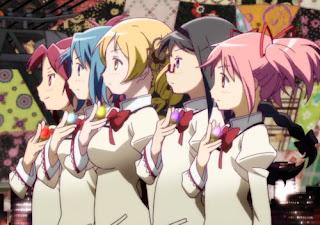 I failed to review Puella Magi Madoka Magica: Rebellion (2013) after tackling the recap movies, in part, because it's impenetrable unless you're already immersed in Madoka's world and lore. On the other hand, fans of the original anime are themselves sharply divided over this film, even a decade after its release: debating whether it's a fitting continuation of the show, an interesting twist on its characters and themes, or a betrayal of its beloved deuteragonist Homura Akemi.
I failed to review Puella Magi Madoka Magica: Rebellion (2013) after tackling the recap movies, in part, because it's impenetrable unless you're already immersed in Madoka's world and lore. On the other hand, fans of the original anime are themselves sharply divided over this film, even a decade after its release: debating whether it's a fitting continuation of the show, an interesting twist on its characters and themes, or a betrayal of its beloved deuteragonist Homura Akemi. A few months ago I penned a detailed, fan-focused breakdown of the movie's plot and themes for The Avocado, which I'll try to summarize in readable form. It’s easy to enjoy Rebellion’s craft and visuals; it’s possible to appreciate what it’s trying to say about its characters and the nature of love, obsession and fighting fate. Whether it pulls it off, or whether the destination is worth the journey, remains an exercise for the viewer.
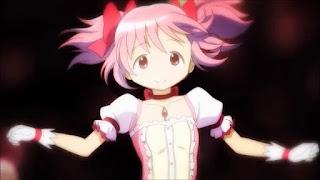
Fourteen year old Magical Girl Homura Akemi (VA: Chiwa Saito/Cristina Vee) arrives in Mitakihara City, making fast friends with Madoka Kaname (VA: Aoi Yuuki/Christine Marie Cabanos) and her Magical friends. Together, the "Holy Quintet" - Homura, Madoka, Mami Tomoe (Kaori Mizuhashi/Carrie Keranen), Kyoko Sakura (Ai Nonaka/Lauren Landa) and Sayaka Miki (Eri Kitamura/Sarah Anne Williams) - protect the city from magical monsters called "Nightmares" while forming a friendship Sailor Moon would envy. Problem is, Homura remembers a past where the Magical Girl experience was much more traumatic and her relationships much more fraught. She investigates what's wrong with the idyll before her, coming to believe that her friends are being manipulated by a reality-warping Witch...she's more right than she imagined.
For those who enjoyed Madoka Magica's gonzo paper-collage visuals, Rebellion won't disappoint. Directors Akiyuki Shinbou and Hiroki Yamamura exploit an expanded theatrical budget to blow visuals beyond the original series, reveling in elaborate sequences. The opening scenes create a playful Nightmare labyrinth with the Puella Magi engaging in comically-elaborate transformation scenes. The action soon gives way to surreal visuals, as the Witches' wards bleed into Homura's reality. Rebellion works best in its crazy set-pieces: a nightmarish bus ride into the abyss, Homura and Mami's gravity defining shootout, scenes where Homura realizes who the Witch must be. It culminates in a final battle that is a madhouse of collage imagery, with the Witch's Familiars doing battle with a full team of Puella Magi in a scene as elaborate as exhausting.
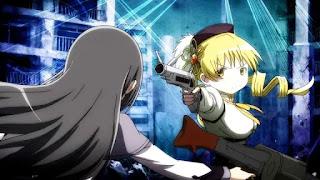
These early scenes (with the Magical Girls defeating a Nightmare by singing it a cheesy "cake song") leads us to believe that the movie might be an alternate universe reimagining of the series, a trope not uncommon in anime film versions. But Gen Urobuchi's script predictably relishes peeling back the layers of this "sweet dream." Far from an idyll, what's witnessed is a gilded cage, with Homura the only one remembering a time when she and her friends fought Witches, a Magical Girl driven to despair and given awesome, world-destroying powers. As Inu Curry's bizarre imagery begins to unfold, Rebellion shifts gears, first into a detective story with Homura and Kyoko investigating the truth, then Homura slowly descending into despair as she's confronted with the horrifying truth of what's going on.
The original series walked a tightrope between bleak, almost existential horror and an affirmation that hope, friendship and feminine power have value even in a broken world. Rebellion infuriated many fans by leaning into nihilism, of the sort of Urobuchi is often (falsely) accused of. Homura's descent is uncannily paralleled with depression, a connection made explicit when she disarms a hostile Mami by shooting herself in the head. By the time manipulative alien Kyubey (VA: Emiri Katou/Cassandra Lee Morris) breaks his uncharacteristic silence to explain what's going on, we're not really surprised to learn that (spoilers from here on) Homura is the Witch, and she's being trapped and exploited by Kyubey and his compatriots to further their weird scheme of gathering cosmic energy.
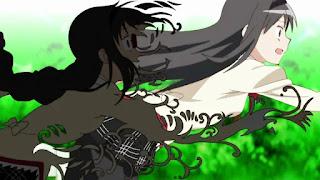
But what infuriated (and still infuriates) fans is Rebellion's finale. Homura's familiars are defeated by Madoka and friends, including newbie Magical Girl Nagisa (VA: Kana Asumi/Xanthe Huynh), and Madoka resumes her God form to bring Homura into Heaven...but Homura rejects this. Instead, she pulls Madoka from her throne, morphs herself into a winged Demon and remakes the world in her image. She's ruling the Universe, making sure her friends remain ignorant of their past (one scene has her wipe Sayaka's memory to discourage her from fighting back), but at the cost of her soul and humanity. Still, at least she gets revenge on Kyubey, in a way even detractors of the movie appreciate.
What one makes of all this is up to the viewer. The tragedy of Homura's wish to save Madoka in the original series was that, by making it her mission to protect her friend/crush, she diminished Madoka's strength and agency - something Madoka retook in the finale, with a vengeance. Homura made her peace with Madoka's decision at the end of Madoka Magica, allowing it to end on a hopeful, if bittersweet note. Here she still hasn't gotten over that, convinced that Madoka didn't want to sacrifice herself, which several conversations with an amnesiac Madoka reinforce. Her resulting actions are totally understandable, given her character arc and the galactic quantity of trauma she's experienced. That doesn't mean it works, though.
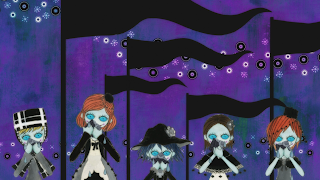
Because Rebellion's greatest shortcoming is the pacing. Urobuchi's ripe, philosophic monologues, a trademark of his work for better or worse, range here from a heady treat to tedious wheel-spinning. Some of the set pieces, impressive as they are visually, could have been trimmed with no harm to the narrative (the Homura-Mami gunfight does go on and on). But the biggest problem is that the abovementioned twist, a truly earth-shaking revelation, isn't given room to breathe. Homura doesn't make her fateful decision until the last twenty minutes of the movie, and we're left with a rushed coda that leaves viewers a bitter aftertaste. Any hope that Madoka Magica seemed to offer viewers was violently wrenched away from them, playing almost as a sick joke on fans.
Studio SHAFT has been teasing a fourth Madoka film for years, releasing a "concept film" and even an official trailer in spring 2021. (Certainly the miserable Magia Record spin-off anime impressed few viewers, and answered none of their questions.) . Until then, our last image of Homura is her dancing madly in a field, with a crumpled Kyubey twitching traumatically at her feet. No surprise that fans didn’t go for this. No surprise that, even today, Rebellion is more likely to excite argument than admiration.

